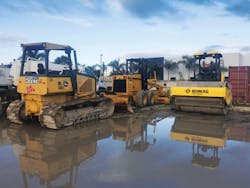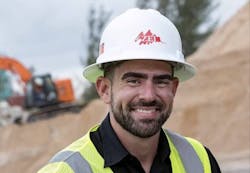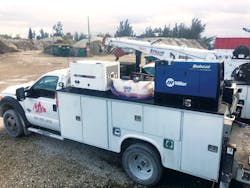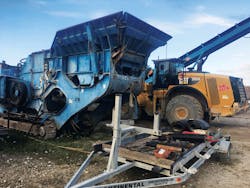Jordan Zahlene Builds a Legacy
“I’ll never forget where I started, but I always think tomorrow has to be better than today,” says Under 40 in Construction Equipment Award winner Jordan Zahlene, VP of Zahlene Enterprises (ZEI), a Miami, Florida-area aggregate recycling, sitework, and paving company.
“I’m always working on something, always trying to advance myself, always trying to make things more efficient,” Zahlene adds. “Every day, you remind yourself that you always have to progress to make yourself and the company better.”
These are likely some lessons learned, and examples set, by his father.
Zahlene’s father, a Cuban immigrant who came to the U.S. in 1982, had started a small business from nothing other than his experience as a delivery truck driver in Cuba: His last route on the island was delivering crackers.
“He bought a dump truck, and went to work for a broker, but around 1998 he got his own clients, specifically in the septic tank industry,” Zahlene says. “He had two trucks at that point, and had a boutique delivery service with the dump trucks for the septic tanks.
“In that business, you need the skill to get in and out of tight spaces, and the patience to wait to be loaded by a backhoe. But the drivers dispatched by bigger brokers, they don’t want to wait,” Zahlene says. “So he ended up cornering the local market.”
But in 2006, when Zahlene was just 15 years old, his father died in a construction accident.
“He never [ventured] into construction, he was always about the hauling and the dump trucks,” Zahlene says. “He owned the trucks and a few front-end loaders to load the trucks here with everything he would get on the back hauls.
“When my dad passed, it was solely my mom, sister, and I; we had four dump trucks, and we would buy the sand from the quarries and sell it to the septic tank contractors, and then we would bring the fill back and maybe sell it,” Zahlene says.
With the small group of construction trucks, the loaders, and a piece of property, there was a decision to make, as if the pressure of being a teenager and deciding on a college wasn’t enough.
“At that time, I still wasn’t sure I wanted to stay here,” Zahlene says. “I was hesitant; do I go away for college or do I stay here, expand the family business, and become a civil engineer? That moment was when I decided I can just stay here and I’ll do this.
“I applied to MIT, Florida, and Florida International University,” Zahlene says. He was accepted at MIT, but decided to forgo the prestigious school, stay local, and continue to work the family business while studying for a Civil Engineering degree at FIU.
With the help of his mother, he expanded the recycling business with an eye on construction, but slowly. Achieving a balance was difficult.
“I don’t know how I balanced, but my mom helped out a lot, so it was just her and I, and my sister,” Zahlene says. “It was hard, I’m not going to lie. Throughout college, I never took on more than one or two construction jobs at one time. It was mostly drainage and [up-to-base] paving jobs for small shopping centers.
“When I kind of took over with my mom, that’s when I wanted to do a little bit more,” Zahlene says. “That’s when all the construction from the beaches was going on, and they had nowhere to take all that beach sand. The sand was ending up in the lakes, so I had the idea to bring it here and screen it, and try to get it to pass as septic sand, which I did. I ended up making my first big purchase of equipment when I was 17 years old, which was a screener.”
Zahlene bought a Chieftain 1800 Powerscreen, after first trying a makeshift static screen he and his godfather built, made out of wire.
“I was trying to get it to a certain particle size, at that point it was ½-inch minus,” Zahlene says. “We did a few loads and the clients liked it, and it passed when we tested it. That’s why I made the first investment on the Chieftain. In order to get faster production, I bought an excavator.
“Then all of the rocks and pieces of concrete that would come in the sand started to pile up, so that’s when I said, ‘Wait, maybe I can turn this into something,’” Zahlene says. “And that’s how the decision on buying the first crusher came along.”
ZEI had turned niche trucking into aggregate recycling, but Zahlene had construction on his mind.
“I got into construction because one of our septic clients heard that I had an excavator; these septic tank guys have smaller excavators and backhoes, they don’t really have [Hitachi] 330-sized machines,” Zahlene says.
“First he called me to rent it, so I asked him why?” Zahlene says. “He said he needed to rent it because he had to do drainage. So I said, ‘I won’t rent it to you, but I’ll do the job for you, just sub me out.’
“And then he asked if I knew how to do drainage, and I said, ‘Yeah,’” Zahlene says, sheepishly. “But I didn’t know how to do anything like that. I was 18 years old at the time. So he sent me the set of plans, and I asked a few guys, then I hired somebody over the weekend to help me. He was the one who taught me how to read plans and how to do a drainage. I was a loader operator—that’s the only thing I knew how to operate at the time. So after he taught me how to read plans and do a drainage, that’s how I got my first taste of construction.”
Recycling continued, with a key Fort Lauderdale airport job crushing and processing concrete as a subcontractor to Tutor Perini, and construction work expanded, causing a small, modest fleet to grow.
The expansion hasn’t always been smooth sailing. Zahlene recalls seeing skepticism from potential customers because of his age.
“Never let your age get in the way,” Zahlene advises, “especially in this industry where people don’t always tend to take you seriously. When I was starting out, it was a real big factor to get people to trust you with a million-dollar contract, and they’re looking across the table at somebody who could be their kid.
“My first real drainage contract, I was 19 years old,” Zahlene says. “It was a section for $300,000. And I remember I had a meeting, and the guy almost pulled out when he met me, but I had the most competitive price. I told him, ‘Look, you can just fire me whenever you want if we don’t perform. Regardless, you’re always going to have your retainer, so what do you have to lose?’ ‘I have time to lose,’ he said. So I told him not to pay me in the first month, pay me on the second month, and that way you have two full months to see the way that we produce. That kind of got him on the hook, and we ended up finishing the job two months ahead of schedule. He said he was really impressed, and that he was sorry for having just judged me on my age.”
In his quest to become more efficient as the business has grown, Zahlene has developed more interest in technology. He uses telematics on his Hitachi, John Deere, and Caterpillar machines, and he has purchased several drones.
“Right now we use JDLink and VisionLink,” Zahlene says. “We use the alert functions a lot, and that helps my fleet manager directly try to take care of the problem. We do all our own maintenance, and we also track fuel usage. We have a reader on our fuel and lube truck, so we track that report against the hours on the machine [reported by telematics]. I’m trying to track hourly costs, too. I’m still learning as I go.”
Zahlene uses his drones to document job progress and examine stockpiles. “We’re experimenting to keep better control of our stockpiles,” he says. “That’s in the testing phase. People still hire us to do contract crushing or contract screening, and we usually like to keep track in order to quote the work, and also to measure our stockpiles so we can see our production. We’re using an HCSS program to kind of keep everything, so that’s how we’re starting to do drone volumetrics.”
His future aspirations include asphalt paving and doing more work for the Florida DOT. “We recently got prequalified to do FDOT work, so I want to take advantage of that and branch out into that market,” Zahlene says. “I feel like there’s a lot there, since we still perform a lot of work that goes with horizontal work. Then hopefully in five years we’d be pretty well invested into the FDOT sector, and maybe in 10 years, we can get into bridge work. I’d like to be all horizontal. That’s a natural progression.”
ZEI’s first FDOT job as a prime contractor is in the Florida Keys. “We’re doing shoreline repair from Hurricane Irma,” Zahlene says. “It’s a $3.3 million contract, so I’m pretty excited about that. We’re focused on finishing that well. The better you do with the DOT and develop a good reputation with them, they allow you to bid a bigger volume with them.”
He’s also focused on building the company at a management level, after spending a lot of time focused outside, in the field. “Now I’m going to take it back inside a little bit and loosen the reigns on the outside,” Zahlene says. “It’s a battle, but as the owner, you have to be everywhere. Sometimes I’ve been too fast to jump out from behind the desk to get outside.”
ZEI’s current fleet has an ERV of more than $9 million, and includes over 70 pieces of equipment. The company has 58 employees. When Zahlene graduated college in 2014, the company had two excavators, a crusher and a screener, two loaders, and seven employees. “I honestly didn’t intend to grow so fast,” he says. “While it was happening, I didn’t really notice until it got to the point where I was having issues with the machines and realized I didn’t have a fleet manager. I only had one service tech; now we have four. It has surprised me how far you can go in a short time just through hard work and dedication.”
What would his father think if he saw him now? Zahlene doesn’t hesitate to answer, even for one beat.
“He’d think I’m crazy!” he says. “He was more of a safe bettor. He didn’t put a dollar out unless he knew he was going to get two back.
“He came from nothing and built something,” Zahlene says. “It was different for me because thank God he left me a platform with this piece of property that’s paid for. I have put things on the line, yes, but he did it from the ground up. I mean from ‘the ground’ ground. I was left with an option, and I was able to grow it.”
And it’s still growing. The FDOT certification and preparing for asphalt paving proves that Zahlene continues to think big.
“After his first reaction of ‘You’re crazy,’ once he would see how it has progressed and what the organization has turned into, I think he’d be proud and I think he’d support it.”



